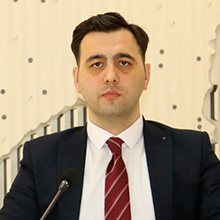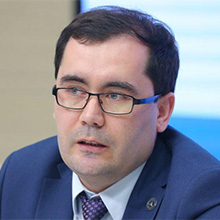
The Rise of Trans-Caspian Routes amidst Russia’s Isolation  By Vusal GULIYEV, Visiting Research Fellow at the Asian Studies Center of Boğaziçi University By Vusal GULIYEV, Visiting Research Fellow at the Asian Studies Center of Boğaziçi University
In light of Russia’s increasing isolation from global markets due to a series of Western-led sanctions, the development of functional, secure, and integrated freight railway networks between Europe and Asia, beyond the territory of the Russian Federation, has come to dominate the discourse over the past several months. The disruption of commercial operations through the northern rail lines catapulted the popularity of the Trans-Caspian International Transport Route (TITR), an overland network of road, rail lines, and maritime transport that traverses Central Asia, the South Caucasus, and Middle East whilst circumventing Russian territory. Consequently, the current geopolitical circumstance in Eastern Europe has allowed the host economies of the TITR—i.e., Azerbaijan, Kazakhstan, Georgia, and Türkiye—to reinforce the development of mutual political and economic bonds in order to strategically and effectively operationalize a uniform policy toward the sustainable implementation of the TITR. In the wake of heavy economic sanctions on Moscow, the major transit countries located along this overland trade channel have taken concrete steps toward achieving the expansion of transcontinental transit opportunities and attracting more international cargo shipments by realizing the rapid commercialization of this multimodal cross-regional route.
READ MORE
- EGF Editor |
Published on EGF: 06.12.2022
| Markets
-
Geopolitical Change and the Re-Emergence of the Middle Corridor
 By Fuad SHAHBAZOV, Baku-based independent regional security and defence analyst By Fuad SHAHBAZOV, Baku-based independent regional security and defence analyst
As the war in Ukraine escalates and becomes more violent, global food and energy recession risks continue to increase, in turn further heightening the likelihood of a global economic recession. The new full-scale war revealed particular vulnerabilities of the Western block of countries, particularly on energy and supply chain management, due to their imposition of sanctions and export restrictions on Russia. Hence, new security challenges in Europe have forced the Western block of countries to explore new and safer trade routes while avoiding Russian territory. With the West’s search for new and safer trade routes, the Middle Corridor—a joint venture composed of Azerbaijan, Georgia, Kazakhstan, and Türkiye—has regained strategic prominence. READ MORE
- EGF Editor |
Published on EGF: 29.10.2022
| Markets
-
Azerbaijan’s Latest Steps Toward Becoming a Regional Digital Hub  By Ayaz MUSEYIBOV, Head of Department, Center for Analysis and Communication of Economic Reforms of the Republic of Azerbaijan
By Ayaz MUSEYIBOV, Head of Department, Center for Analysis and Communication of Economic Reforms of the Republic of Azerbaijan
After implementing a number of trans-Eurasian energy and logistics mega-projects, such as the Baku–Tbilisi–Ceyhan oil pipeline, Southern Gas Corridor and Trans-Caspian International Transportation Route, Azerbaijan has also strategically committed itself to policies designed to turn the South Caucasus country into a regional digital hub. This initiative has already secured buy in from several countries and major companies in the IT space. Notably, this past April, Italy’s largest internet service provider and one of the world’s leading operators, Sparkle, and Azerbaijan’s top wholesale telecommunications operator, AzerTelecom, signed a memorandum of understanding on cooperation within the framework of the Digital Silk Way project (not to be confused with China’s Digital Silk Road), aimed at creating a digital telecommunications corridor connecting Europe and Asia via Azerbaijan. READ MORE
- EGF Editor |
Published on EGF: 01.07.2022
| Markets
-
How Will the Ukraine Crisis Shape the World Energy Market?
 By Fuad SHAHBAZOV, Baku-based independent regional security and defence analyst By Fuad SHAHBAZOV, Baku-based independent regional security and defence analyst
Russian military aggression against Ukraine launched almost two months ago has clearly signalled a change in the traditional world order and triggered the unprecedented reaction of the Western coalition led by the U.S. The ongoing conflict between Russia and Ukraine has left the global energy market uncertain, threatening to cause severe energy shortages and oil prices exceeding $110 per barrel.
Since the Russian intervention in Ukraine kicked off, numerous sanctions packages have been imposed on Russia, hitting mostly financial institutes and state-owned companies. This resulted in Western countries’ consolidation, and the collective refusal of Russia-related transactions and import of Russian natural gas, oil, and coal. READ MORE
- EGF Editor |
Published on EGF: 12.05.2022
| Energy
-
The Rising Strategic Role of Azerbaijan in Euro-Asian Economic Relations  By Ayaz MUSEYIBOV, Head of Department, Center for Analysis and Communication of Economic Reforms of the Republic of Azerbaijan
By Ayaz MUSEYIBOV, Head of Department, Center for Analysis and Communication of Economic Reforms of the Republic of Azerbaijan
Currently, energy and trade routes security is one of the major considerations at the global level. In the wake of the recent global events, the importance of energy resources is more likely to become a dominant matter which the global economy tremendously needs.
Energy supply to Europe, particularly to South and South-Eastern Europe, depends on only one source. However, the European Commission is accelerating the economic diversification processes beginning with the gas routes in order to reduce the economic dependency. Hence, the EU has already held various talks with energy players such as Egypt, Qatar, the United States, South Korea, Nigeria, and Azerbaijan to increase natural gas supplies in the case of a gas crisis. READ MORE
- EGF Editor |
Published on EGF: 06.04.2022
| Markets
-
Why Are Gas Prices So High?   by Dr Jack Sharples (Oxford Institute for Energy Studies and EGF Associate Researcher) by Dr Jack Sharples (Oxford Institute for Energy Studies and EGF Associate Researcher)
Mike Fulwood (Oxford Institute for Energy Studies)
We analyse the drivers behind ongoing price rally and offer an outlook for the coming winter. On the global LNG market, unexpected outages meant that growth in supply simply did not keep pace with the increase in demand. Given its role as the ‘balancing market’, European LNG imports declined. This combined with declines in European production and pipeline imports to open a supply gap that could only be met by withdrawals from storage. We conclude that with gas markets noticeably tighter, the ongoing price rally is driven by fundamentals, with an added ‘fear premium’ that the forthcoming winter could be as cold as that in 2020/21. If that proves to be the case, the current price levels will persist, and even rise, while a milder winter could see the market turn slightly more bearish. READ MORE.
- EGF Editor |
Published on EGF: 02.10.2021
| Markets
-
The Strategy of Actions: A Guideline for Uzbek Reforms  By Eldor TULYAKOV, Executive Director, Development Strategy Centre By Eldor TULYAKOV, Executive Director, Development Strategy Centre
Furkat YUNUSOV, Head of Department, Development Strategy Centre
Four years ago, Uzbekistan launched reforms critical to the development of its economic sphere. Based on the Strategy of Actions, the document responsible for outlining the priorities for the country’s growth for the period of 2017-2021, as a metric we have arrived at initial finding, with several indicators demonstrating progress, most notably the areas of public administration, social and civic institutions, mass-media, economic advances, among others. The past four years have evidenced precise results and demonstrated more advanced methods to take these priority areas forward. READ MORE
- EGF Editor |
Published on EGF: 22.09.2021
| Markets
-
Oil Market Collapse Damages the Iraqi Economy  By Ahmed Mousa Jiyad, Development Consultancy & Research, Norway By Ahmed Mousa Jiyad, Development Consultancy & Research, Norway
The collapse of the global oil market is undoubtedly unprecedented in its timing, magnitude, spread and devastating impacts across the globe. A strange and unpredicted association of a few, but major, factors had contributed to the current threat, causing much uncertainty and vulnerability on national and global levels. The revised "OPEC+" production cut agreed on 12 April prompted initial minor improvement in oil price, but there remains very many serious concerns that such reduction is much below what is needed to bring stability to and balances a saturated global oil market. READ MORE
- EGF Editor |
Published on EGF: 15.04.2020
| Markets
-
Will Armenia Withstand the Global Economic Turmoil?  By Benyamin Poghosyan, PhD, Chairman, Center for Political and Economic Strategic Studies By Benyamin Poghosyan, PhD, Chairman, Center for Political and Economic Strategic Studies
The world economy has been in troubled waters since late 2018. The US – China trade war rattled the markets and triggered the significant changes in global supply chains. Many industrial giants were actively discussing the dislocation of production facilities from China to South East Asia nations such as Vietnam and Cambodia seeking to decrease the negative impact of the trade war.[…] However, the novel Coronavirus (COVID – 19) outbreak, which started in Chinese Wuhan city, has launched its seemingly unstoppable march around the globe since late January 2020. READ MORE
- EGF Editor |
Published on EGF: 26.03.2020
| Markets
-
New Russian Embargo - Collapse for Georgian Economy or Historic Chance?  By Nika Chitadze, PhD, Director, Center for International Studies, International Black Sea University, Tbilisi By Nika Chitadze, PhD, Director, Center for International Studies, International Black Sea University, Tbilisi
By Putin's order, flights to Georgia from Russia will be prohibited from July 8. Based on past experience, it can be mentioned, that this step from the official Kremlin may not be a catastrophe for Georgia and on the contrary, to be a chance for the better future. The opening of the Russian market during the last several years and the partial settlement of relations with Russia was considered as a means of growth of Georgia's economy, but the developments since 2013 have proved contradictory.
READ MORE
- EGF Editor |
Published on EGF: 12.07.2019
| Markets
-
|
|
